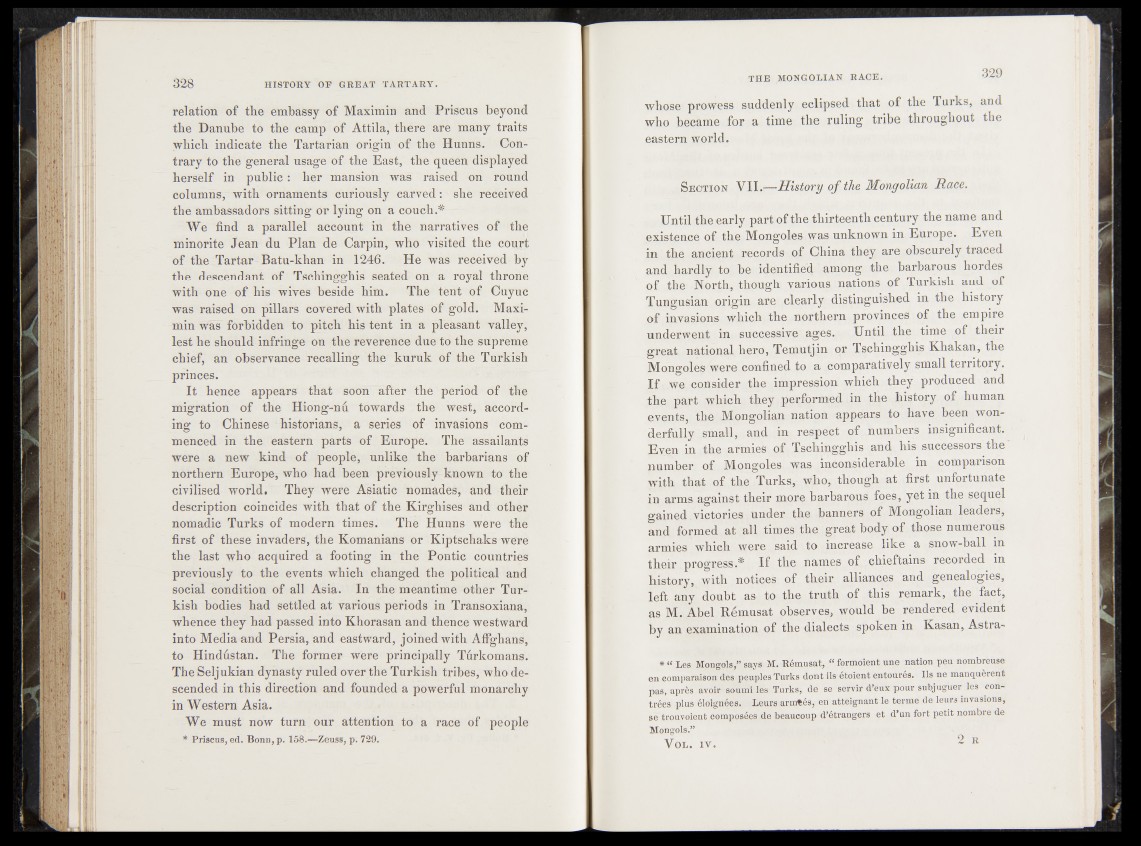
relation of the embassy of Maximin and Priscus beyond
the Danube to the camp of Attila, there- are many traits
which indicate the Tartarian origin of the Hunns. Contrary
to the general usage of the East, the queen displayed
herself in public : her mansion was raised en round
columns, with ornaments curiously carved : * she received
the ambassadors sitting or lying on a couch.*' "
Wè 'find a parallel account in the narratives of thé
minorité Jean du Plan de Carpin, who visited the court
of the Tartar Batu-khan in 1246. He was received by
the descendant of Tschingghis seated on a royal throne
with- one of his wives beside him. The tènt'-öf Cuyuc
was raised on pillars covered with plates ’oflgold. Maximin
was forbidden to pitch his tent in a pleasant valley,
lest he should infringe on the reverence due to the supreme
chief, an observance recalling the kuruk of the Turkish
princes.
It hence appears that soon after the period d#$the
migration of the Hiong-nu towards 'ithél; west, according
to Chinese “historians, a séries of invasions -commenced
in the eastern parts of Europe. The assailants
were a new kind of people, unlike the barbarians of
northern Europe, who had been previously- known to the
civilised world. They were Asiatic nomades, and -their
description coincides with that of the Kirghises and other
nomadic Turks of modern times. The Huons were thé
first of these invaders, the Romanians or Kiptschaks were
the last who acquired a footing in the Pontic countries
previously to the events which changed the political and
social condition of all Asia. In the meantime other Turkish
bodies had settled at various periods in Transoxiana,
whence they had passed into Khorasan and thence westward
into Media and Persia, and eastward, joined with A Afghans,
to Hindustan. The former were principally Turkomans.
The Seljukian dynasty ruled over the Turkish tribes, who descended
in this direction and founded a powerful monarchy
in Western Asia.
We must now turn our attention to a race of people
* Prisons, ed. Bonn, p. 158.—Zeuss, p. 729.
whose prowess. sud,den 1 yt,eclips e^b that of the Turks, and
who hecame-fl^r a timgf-tlie ruliqg; tribe throughout the
eastern, worldm^
,VTT-—History of,the Mongolian Race.
Until the e%$y,part of the^i^|eenth.cefl|ury the name and
je&jsfence of .the Mongo l ^ was, u p ^ ^ y in Eqmp^,, Even
in the ancient ^ftajydss of..^hina they are jobsc^ureiy traced
and hardly Jo be .ideptifie*4''v§'r>0l l^ ^ ie - -barbarous hordes
of i,thp> J^orth, tfe&agh: various fnaitfppj^ of Turkish and of
Tungurian pr%in JarqJft,cl^|^j||^i^^i|tg.ua|shod in th^iiistory
of invasions, which the^n^hern pr^n£<||Uof | thq^n3pirh I
un-derwent in ^ccs.sjyP' .^agesUnti l thgF time^of their
gypajt^pational heipj.fj'.em utj i«n„j ..T^chpigghis Khakan, the
Mongole|<we,re confined tp^a^comparatiyely.smafi territory.
lf^werp|fisider the ^mpressiqa .jwMch. ,the|| .producedand
the part ;w|pcb^ they ^ . p e r i ^ Mt o r y «
the,' ,Mongolian^nat-rph. «-appears a Hay^;^6n^-woii-
' derfiillyfsmil], and in re ^ ^ |t.^ f.^ n b ^ ^ h \s ig n ific a n t^
Eyep. ,in. the armies, o.fivTschipggli|s;^ ^ the
number of, Mqpgo.les,iJ^|as..,iinconsiderable ,in Comparison
with that of the .Turks, whoi;, though ht'ifirst unfortunate
in arms against their more barbai^^fegfej| |h tjn ^ sequel
gq.in^^yictqriea l under the bannej^of Mongolian. lbhdersv
and formed, at ^ fire ie s; the,. grea%bq{Jyi o&.$£se numerous
armies which were said |||^jierease like a snow-hall in
their,progress.* If .the, ..names..of, .chieftains^recorded in
histo®, with notiqe|i’^ their alliances and j^encalogie^
left any doubt ;as§ to the^ttqth of this remark, the fact,
as M.^Abel Rimusat pb/erye^ .would be rendered evident
by an examination of the dialect^ spoken in Kasan, Astra-
* “ Im&x Mongols,” says; M. Rétnusftq-'lformoient un« nation peu nombreuse
en comparaison des-peuples Turks dont ils éfcoïenfentonrés. Ils ne manquèrent
pas, après avoir souïni«'l e s 'Tnrks, de se ‘servir d’Ôrarpbfa.swÿtqpMi^fes e o i-
tréeSi plus éloignées. Leurs armtés, en atteignant !© termefde'leràrs invasions,
aèdrouvoient composéeà'de beaucoup d’étrangers et. d’un fort petit nombre de
Mongols.” $$
V o l . i v . v t ^ R